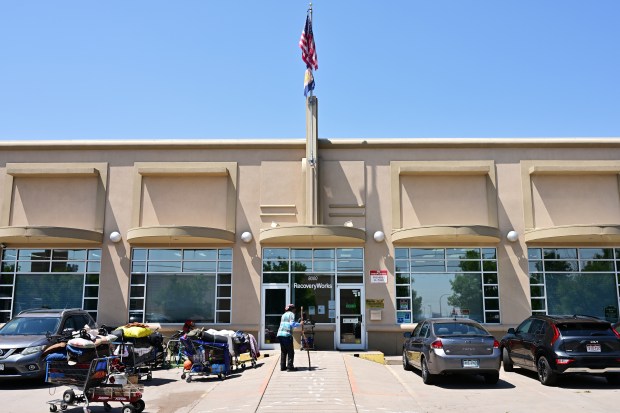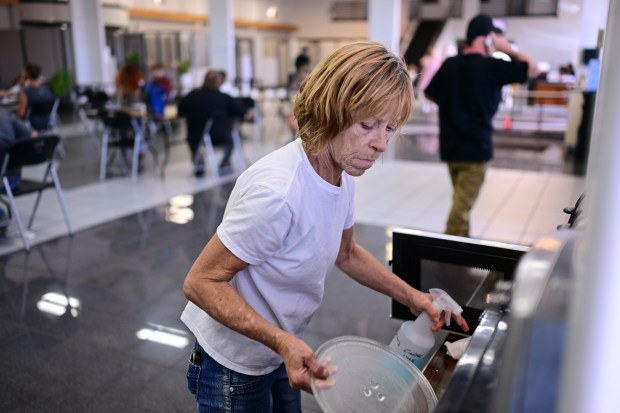Art LaGrange, wearing a tie-dyed T-shirt from a 1975 Led Zeppelin concert, ate a lunch of hot dogs, fries and mixed fruit inside RecoveryWorks’ homelessness hub in Lakewood on a recent weekday.
People in need were all around him. To his right, a bearded man lay sprawled out on a couch, eyes closed and legs akimbo. To his left, a woman — seemingly passed out or asleep — cradled a paper plate, with french fries spilling onto her shirt.
For LaGrange, a 65-year-old Denver native, “this is a safe place.” The former home renovator, who was visiting for lunch last week, said that after he was booted from his apartment when he was low on cash following his wife’s death, he spent several years on the streets of Lakewood and Denver. With help from RecoveryWorks, a nonprofit center that provides a path to housing, he landed an apartment that his Social Security income could cover.
“I was there — I was that person walking through the door,” he said, motioning to the facility’s entrance on West Colfax Avenue. “I thought I’d be dead by now without them guiding me in the right direction.”
Navigation centers like RecoveryWorks — a one-stop shop for people without a home who need a myriad of resources and services to regain a stable place in life — soon will open more doors across metro Denver, where homelessness exploded by 48.5% from 2020 to 2023. No fewer than three new centers are slated for launch in Denver, Aurora and Englewood in the next year or so, while Lakewood will purchase and expand RecoveryWorks, adding overnight shelter beds.
And Arvada recently purchased a 44,000-square-foot building that’s under consideration for conversion to a navigation center or a 24/7 shelter.
“We know community after community is complaining about visible homelessness, and we can’t solve it by doing nothing,” said Cathy Alderman, the chief communication and public policy officer for the Colorado Coalition for the Homeless. “Navigation centers are becoming a best practice for dealing with homelessness.”
The facilities typically have beds for overnight stays, offer three meals a day, and have on hand medical and mental health professionals, addiction counselors and workforce specialists — an array of offerings often referred to as wraparound services. They can be as big as the 289-room former DoubleTree Hotel the city of Denver is targeting for a center or they can offer fewer than 100 beds, as with an Englewood building that once housed a roofing company.
“You should be able to go to these places and sleep for a few nights and weeks while you get your needs met,” Alderman said. “You don’t have to go to six different agencies just to get your needs met.”
Last fall, the Colorado Department of Local Affairs unleashed $52 million in grants toward the development of “regional navigation campuses” in and around Denver. They were the result of two bills passed in 2022 and 2023 by the legislature that directed the department to award money to local governments to make the centers a reality.
A further impetus for navigation centers’ current blossoming is an end-of-the-year deadline for recipients to designate funding from the American Rescue Plan Act for specific purposes and projects. The 2021 pandemic-response stimulus package has helped pay for efforts to address homelessness across the country.
But navigation centers cannot themselves solve the homelessness problem in metro Denver, Alderman warned. They aren’t meant to provide long-term accommodations. And if affordable housing is not available for people trying to take that next step in their lives, she said, the centers will have done little good.
“Solving this homelessness crisis in Colorado needs to be a multi-pronged approach,” she said. “The navigation centers can be that pathway, but that path has to go somewhere.”

Lessons from Houston
That sentiment is shared by Meg Pohodich, CEO of Harmony House in Houston. Her organization runs the Housing Navigation Center in the city’s low-income Fifth Ward.
The city-funded facility opened in early 2023 and received a visit from former Denver Mayor Michael Hancock the autumn before as it was prepping for its debut. Current Mayor Mike Johnston’s administration has also looked south to Texas for clues on how to make inroads on homelessness in the Mile High City.
Texas’ largest city was lauded across the country for its success in reducing homelessness by 63% since 2011 by implementing a housing-first approach. The city has helped nearly 26,000 people get into their own homes since 2012, with close to a 90% success rate, according to the Coalition for the Homeless of Houston/Harris County.
Houston’s navigation center has 112 beds and serves three meals a day to its clients, in addition to offering basic services for those in need. A typical stay lasts from 30 days to 45 days, Pohodich said. It’s a number she doesn’t want to see appreciably rise.
“It looks good — it feels good — to empty a homeless encampment, but if you don’t have an exit strategy for each person, it does you no good,” she said. “If there is no housing available, people are just going to turn a navigation center into a big shelter.”
That lack of a continuum in a person’s journey to stable living is something Melissa Arguello-Green, the CEO of Bridge House, worries about as her organization oversees the conversion of a building on South Windemere Street in Englewood into a navigation center for the south suburbs.
Bridge House already works with homeless populations in Aurora and Boulder.
“We can work with folks all day long,” she said, “but if we don’t have affordable housing available, it’s very hard to move someone into a permanent, stable environment.”
Metro Denver’s home prices and rents are notoriously high, which makes housing attainability an elusive goal for many. Putting even more pressure on the situation, Arguello-Green said, was the U.S. Supreme Court’s decision in June allowing cities leeway to enforce bans on homeless people sleeping in public spaces.
“It has now created an urgency that if we’re going to do (homeless encampment) sweeps, we have to have a place for people to go,” she said.
Englewood Deputy City Manager Tim Dodd said the navigation center is part of the Tri-Cities Homelessness Action Plan, which was launched in 2021 and covers the cities of Englewood, Littleton and Sheridan. The facility is expected to open in late fall, he said.
It will have 20 beds for temporary overnight stays, while another 47 to 50 beds will be reserved for those looking for work or undergoing job training, Arguello-Green said.
Bridge House’s “work-first” approach is similar to Aurora’s philosophy of how best to lift people out of homelessness.
Colorado’s third-largest city in May purchased the 255-room Crowne Plaza Hotel at 15500 E. 40th Ave. to serve as a regional navigation center. The hotel rooms will be reserved for adults looking for work or engaged in job training, though there is 85,000 square feet of convention and congregate space for sheltering people on a more immediate basis.
Aurora’s navigation center, expected to open in the first half of next year, will offer employment services, workforce development, mental and behavioral health services, case management, emergency and day shelter space, and meals. A city spokesman declined to comment further, saying negotiations with a vendor to operate the facility were ongoing.
Denver preps its former DoubleTree
By contrast, Denver takes a “housing-first” approach to homelessness, placing a priority on putting a roof over a person’s head first and foremost, before addressing substance use, mental health or work challenges.
The Metro Denver Homelessness Initiative’s Point-In-Time survey counted more than 5,800 people without a home in Denver in January 2023. Across the metro area, the number of homeless people tallied during the survey was just over 9,000. Data from the January 2024 survey have not yet been released.
Last week, the Denver City Council approved grant agreements with the Department of Local Affairs for a total of $24 million to assist the city in purchasing the 289-room former DoubleTree, 4040 Quebec St. The city plans to convert ballroom space into a service center for people living there, as well as for people from across the city who are struggling with homelessness.
The city has said it can fit around 450 beds in those rooms. The hotel already is serving as a non-congregate shelter as part of Johnston’s homeless initiative.
“Even if you’re not living within that five-story non-congregate shelter hotel, you can walk up to this front door,” Cole Chandler, a senior homelessness adviser to Johnston, told council members recently. “You can talk to a housing navigator. You can get connected to the services that you need in our community to be able to have broader access to permanent housing and the supportive services that are needed to sustain that.”
Back in Lakewood, the RecoveryWorks facility will get a big boost once the city takes possession of the 30,000-square-foot building at 8000 W. Colfax Ave. The city’s elected leaders approved the building’s purchase in June, and Lakewood will use a $9.3 million grant from the state to buy, renovate and operate it.
Dozens of beds for what will be Jefferson County’s first homeless shelter will open at the navigation center facility in late 2025. The building, which previously has been a movie theater and a Harley-Davidson dealership, currently operates only as a day center with navigation services.

“Lakewood has the highest concentration of the unhoused in Jeffco,” said James Ginsburg, RecoveryWorks’ executive director.
Seventy-five to 90 people visit RecoveryWorks a day, he said, with an increasing number of older people making the trek. Regina LeGron, 62, was homeless until she went to work for RecoveryWorks two years ago. She spent nearly a decade on the streets of Texas, Kansas and Colorado with her husband.
“We kept going from motel to motel,” LeGron said.
She now rents an apartment within walking distance of RecoveryWorks.
“They need one of these navigation centers in Lakewood,” LeGron said. “They need a 24/7 center in Lakewood.”
Ginsburg said responses to homelessness thus far have been “pretty Denver-centric.”
“Communities that have been slow to respond realize they need to,” he said. “We can’t ignore the problem anymore and push it block to block and hope it disappears.”
Staff writer Joe Rubino contributed to this story.
Get more Colorado news by signing up for our daily Your Morning Dozen email newsletter.